As an HR manager or a business owner, you surely know how costly and complex managing employee holidays can be. Not only do you need to pay for actual holiday time off, but there is also the mess of having to comply with specific statutes when it comes to paid days away.
So, if you want a bit of clarity on what exactly constitutes ‘paid leave’ in Europe, this blog post will provide all the answers!
From the statutory minimums and rules surrounding holiday pay, we’ve done our research so that all your questions concerning paid holidays by law are answered. So, sit down, and let’s dive into everything related to those hard-earned (and legally required) moments of blissful rest.
Public Holidays
As a leading region in the world, Europe enjoys a well-deserved reputation for its rich cultural heritage, diverse landscapes, and vibrant societies. However, it is also home to some of the most generous public holiday entitlements, where employees can enjoy paid time off (PTO) on special occasions.
Each member state of the European Union is responsible for determining its own public holidays. But some of the most widely celebrated across the continent include:
- New Year’s Day (January 1st)
- Easter (the date varies each year, but typically falls in March or April)
- Labor Day (May 1st)
- Ascension Day (40 days after Easter)
- Whit Monday (7th Monday after Easter)
- Christmas Day (December 25th)
- Boxing Day (December 26th)
Interesting facts and statistics:
- On average, France has 32 public holidays per year, which is the highest number among all European countries.
- The UK employees enjoy the lowest number of public holidays on the continent (yet one of the most generous paid vacation leave).
- Christmas and New Year’s Day are the most widely celebrated holidays in Europe.
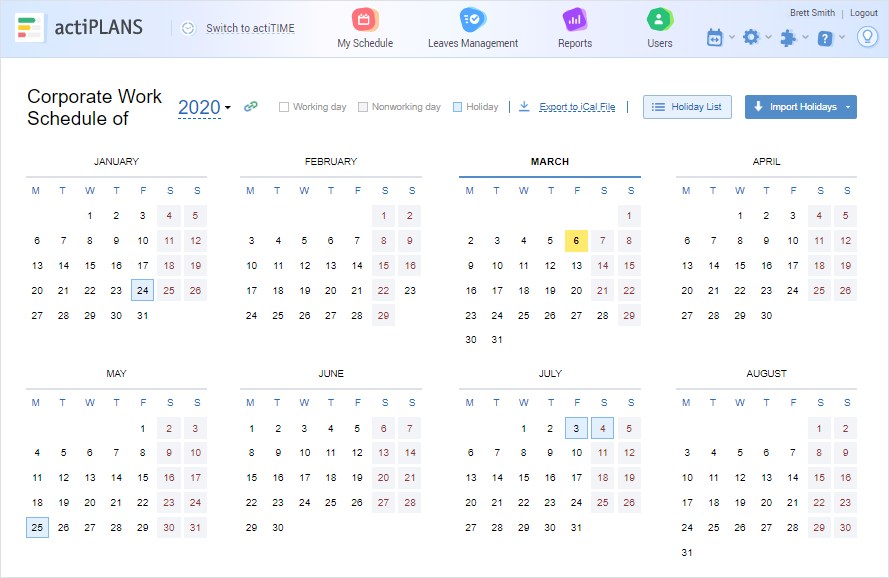
Customize your work calendar and track public holidays without a hitch with actiPLANS
Vacation + Personal Days Off
According to the EU Working Time Directive, all workers are entitled to a minimum of 4 weeks of paid vacation time per year (i.e., 20 working days of PTO per year). This entitlement is non-negotiable and applies regardless of the type of employment contract or the industry in which the worker is employed.
The 4 weeks of annual paid leave may not be replaced by a payment in lieu, except when the employment relationship is terminated.
In addition to the above EU-wide requirements, each member state has its own policies and laws. Thus, the number of paid vacation days may slightly differ from one country to another. For example:
- France, Sweeden, and Denmark offer 25 days of paid annual leave to employees,
- Spain and Portugal have 22,
- Luxemburg has 26 days of annual leave,
- And Estonia – 28.
On top of that, some countries offer additional leave benefits to long-term employees. In Poland, for instance, those just starting their jobs get 20 paid vacation days per year, while those who worked in the same company for over 10 years get 26 days off (Source).
Sick Leave
According to the EU Working Time Directive, “The improvement of workers’ safety, hygiene and health at work is an objective which should not be subordinated to purely economic considerations.” However, there is no EU-wide sick leave policy in place, so sick leave rules vary depending on the country and the employer.
The European Commission states that all EU member states guarantee workers the right to sick leave and related monetary benefits. Yet the duration of full or partial compensation for the lost income differs significantly from one country to another:
- The Netherlands has one of the most generous paid sick leave policies on the continent –Dutch employees are entitled to up to two years of monthly sick pay that covers at least 70% of their wage (Source).
- In contrast, Lithuania has one of the shortest sick leave periods – just two working days during which the employer is mandated to pay employees 62,06-100% of their average wages (Source).
Almost all European countries offer some form of protection from dismissal during short-term sick leave (except Denmark). However, even in states where such protection is guaranteed by law, workers still can lose their jobs if their sickness lasts for an extended period of time. For example:
- Polish workers can be dismissed if they are absent for more than three months.
- And in Latvia, employers have the right to fire workers who can’t come to work after 26 weeks of sickness benefit.
People who cannot work due to a long-term illness usually can claim disability benefits guaranteed by social security authorities.
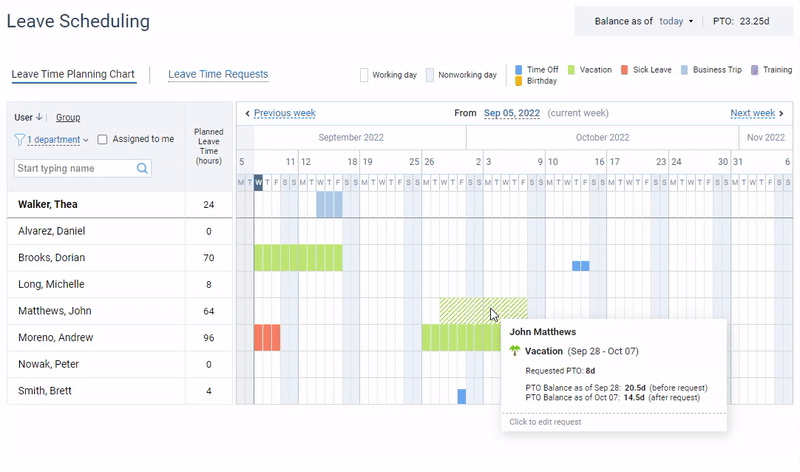
Use actiPLANS to schedule and track any kind of time off in an effortless way
Family Leave
Taking care of young children or elderly dependents can have a significant impact on an individual’s ability to pursue their career goals. Hence, the EU has developed the Work-Life Balance for Parents and Carers directive with the aim of improving the well-being of parents and carers, as well as promoting gender equality in the workplace.
Paternity leave
The directive introduced the right to a minimum of 10 working days of paternity leave paid at a level equal to the rate of the currently set maternity leave. This was done because paternity leave is a topic of growing importance in Europe, and more and more families want fathers or second parents to have the opportunity to be actively involved in the upbringing and care of their newborn child.
Carer’s leave
Carer’s leave is a form of paid leave provided to employees who are responsible for the care of their relatives in need of medical assistance or support. The EU directive has recently mandated that employees receive a minimum of 5 working days of carer’s leave per year.
Member states may offer leave on a case-by-case basis or introduce additional conditions for the exercise of this right. However, the overall goal of carer’s leave is to provide workers with the necessary support and flexibility to balance their caregiving responsibilities with their professional commitments.
Parental leave
Parental leave is a social benefit that provides workers with time off from work to care for their newborn or newly adopted child. The Parental Leave Directive established the minimum standard for parental leave in the EU and ensures that all employed parents, regardless of gender or employment status, have the right to take parental leave.
The Work-Life Balance directive introduces some changes to parental leave regulations – each EU worker is now entitled to 4 months of parental leave, out of which 2 months are non-transferable between one parent to another and are paid at the sick leave rate set in the country.
Maternity leave
The 1992 Pregnant Workers Directive sets out the 14-week minimum requirement for maternity leave, with 2 weeks of compulsory leave before and/or after childbirth.
In addition to the 14-week minimum, some EU countries offer even longer periods of leave. For instance, employed women enjoy:
- 16 weeks of maternity leave in Spain,
- 18 weeks of leave in France,
- 30 weeks in Croatia.
The amount of maternal leave pay varies as well.
For example:
- Spain, Italy, and France pay 100% of employees’ wages for maternity leave,
- Belgium pays 82% of wages,
- And Slovakia – 75%.
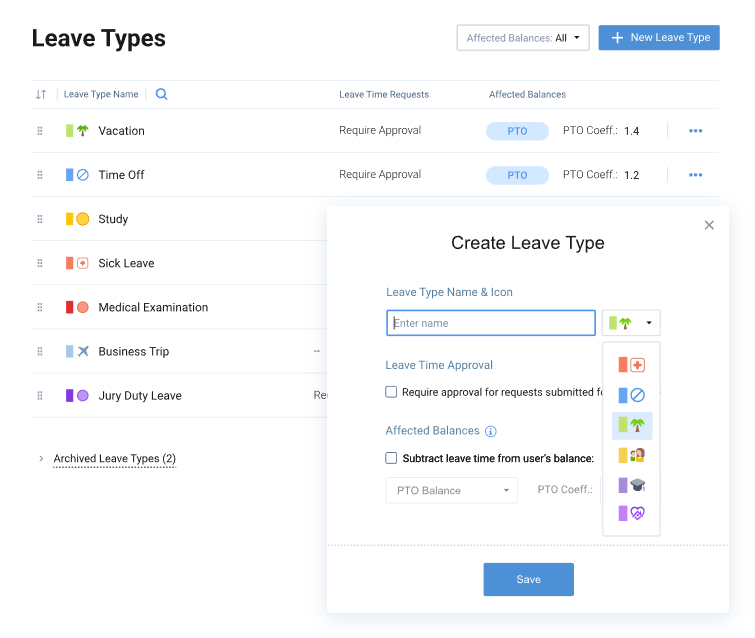
Create multiple custom leave types in your actiPLANS account to collect precise staff absence data
Bereavement Leave
In Europe, bereavement leave laws vary from country to country. In some nations, employers are legally required to grant employees a certain amount of paid or unpaid leave when experiencing the loss of a loved one.
For example:
- In the United Kingdom, employees have the right to take 2 weeks of parental bereavement leave in case of stillbirth or the death of a child under 18 years of age.
- Belgian employees are entitled to up to 10 days of bereavement leave in case of the loss of a spouse, partner, or child.
- In Spain, the law provides employees with 2-4 days of paid leave for the loss of a spouse, child, grandparent, or grandchild.
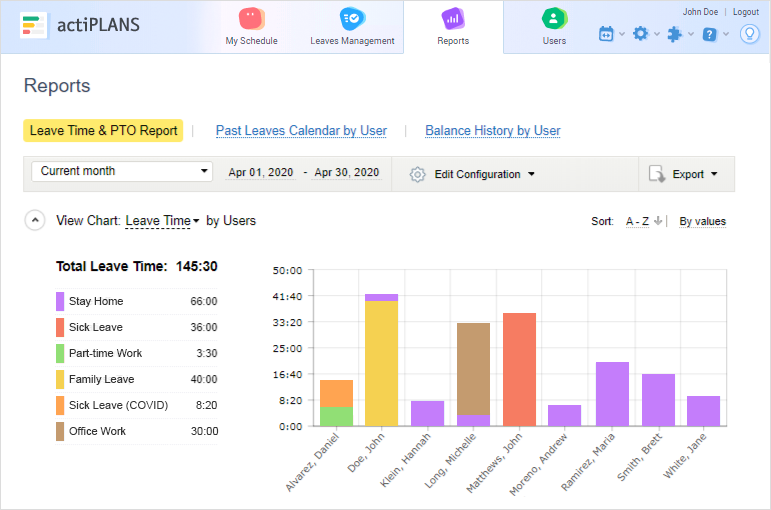
Analyze your team’s absence trends using detailed actiPLANS reports
Jury Duty Leave
There are no region-wide regulations on jury duty leave in Europe. However, some countries require this benefit by law:
- In Malta, employees who have to be absent from work due to jury duty service are entitled to full pay for the missed working days.
- In the UK, employers are required to provide employees with a sufficient period of unpaid jury duty leave. Individuals can claim compensation for the loss of earnings, travel, and other expenses from the court.

Use actiPLANS Mobile to request leave and track colleagues’ availability wherever you are
Military Leave
Military leave laws in Europe vary depending on the country. The length of the military leave varies as well and is usually agreed upon between the parties on a case-by-case basis.
European military leave regulations include the provision of special employment protections for military personnel who have been called up for service.
In Finland, for example, employers are prohibited from firing or otherwise disciplining employees who are called up for military service and cannot refuse it without legal consequences.
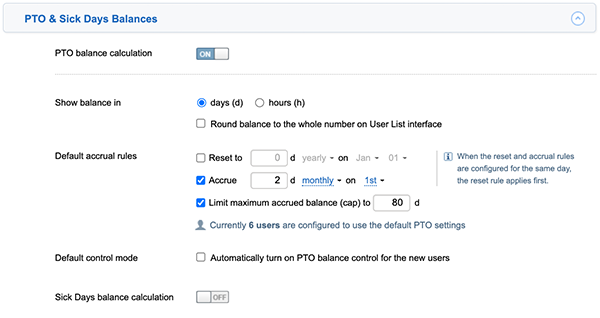
Set your own time off accrual rules in actiPLANS to ensure 100% compliance with the law
Leave Management Rules
Time off management rules vary not only from one European country to country but also from one business to another provided that the region-wide requirement for the minimum vacation days is met.
Time off accrual
Time off accrual is the process of accumulating PTO over a certain period of time, commonly on a yearly basis, as a part of the employee benefit package. The amount of accrual can vary based on the company policy, position, or tenure.
It’s common for employees to earn a certain number of leave hours each month, with the amount increasing as the employee gains experience or seniority.
Sometimes businesses also use the “front-loaded” system, where employees are given the total amount of vacation time at the beginning of the year. This system is advantageous for employees who prefer to plan their vacations ahead of time and prioritize work-life balance.
Carryover rules and compensation for unused vacation days
According to the European Court of Justice (ECJ), workers cannot lose vacation days earned during employment and must be compensated for any unused time off (unless an employer can provide proof that the employee had a reasonable opportunity to take time off).
The ECJ also underscored that employees cannot withhold taking their vacation days, intentionally or otherwise, in order to build up a lump-sum payout at the end of their contract because such an approach is incompatible with the EU Working Time Directive (Source).
Conclusion
Paid holidays are a fundamental aspect of our working lives, and it is important to be aware of Europe-wide rules when considering the provision of paid holiday leave. Knowing the policies that apply across countries where your organization operates lets you plan in advance and make the most out of this benefit for your employees.
With actiPLANS, this doesn’t have to be a complex process.
This resource scheduling platform allows you to:
- Create multiple leave types,
- Customize your time off management rules,
- Submit and approve leave requests in a matter of seconds,
- Analyze leave data in depth,
- Schedule project resources, employee shifts, etc.
All in all, actiPLANS simplifies the process of leave management for employers and employees alike. Sign up for a free trial today and make sure that all kinds of leave – including paid holidays – are taken into account and tracked in real time.



